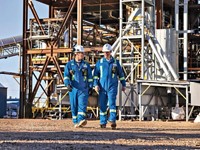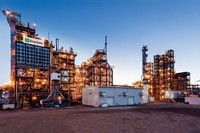Advertisement
Grab your lab coat. Let's get started
Welcome!
Welcome!
Create an account below to get 6 C&EN articles per month, receive newsletters and more - all free.
It seems this is your first time logging in online. Please enter the following information to continue.
As an ACS member you automatically get access to this site. All we need is few more details to create your reading experience.
Not you? Sign in with a different account.
Not you? Sign in with a different account.
ERROR 1
ERROR 1
ERROR 2
ERROR 2
ERROR 2
ERROR 2
ERROR 2
Password and Confirm password must match.
If you have an ACS member number, please enter it here so we can link this account to your membership. (optional)
ERROR 2
ACS values your privacy. By submitting your information, you are gaining access to C&EN and subscribing to our weekly newsletter. We use the information you provide to make your reading experience better, and we will never sell your data to third party members.
Environment
Fuel From Garbage
Canadian facility will be first to produce ethanol from solid waste on an industrial scale
by Michael McCoy
July 7, 2008
| A version of this story appeared in
Volume 86, Issue 27
Two Canadian companies have won government backing for what they say will be the world's first facility to convert municipal solid waste into ethanol on an industrial scale.
The $70 million plant will be built in Edmonton, Alberta, by GreenField Ethanol, Canada's largest ethanol producer, and Enerkem, a Quebec-based biofuels technology company. The city of Edmonton and the Alberta Energy Research Institute (AERI) will contribute $20 million and the two companies the rest. The city will also put $50 million into separate waste processing and research facilities.
The technology comes from Enerkem, which has research ties to Quebec's University of Sherbrooke. Enerkem's ethanol process sorts and gasifies municipal waste and purifies the gases into the mixture of carbon monoxide and hydrogen known as syngas. It then catalytically converts syngas into ethanol and methanol. The company claims a cost advantage over competing second-generation ethanol production techniques that use enzymes to break down cellulose into sugars for fermentation into ethanol.
Edmonton Mayor Stephen Mandel says the plant, set to open in late 2010, will help reduce greenhouse gases and make the city the first in North America to divert 90% of its residential waste from landfills.
John J. Murphy, president of Catalyst Group Resources, a consulting firm that monitors catalytic biofuel processes, says AERI's backing is a sign that Enerkem's process is technologically sound. He notes, however, that government monetary backing is a sign that the plant may not be financially sound.
"Support from an ExxonMobil or a ConocoPhillips would give it more economic credibility," he says. "Return on investment is not measured the same when taxpayers are paying as it is when shareholders are paying."




Join the conversation
Contact the reporter
Submit a Letter to the Editor for publication
Engage with us on Twitter